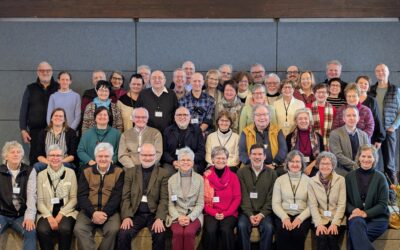A teacher recounts, “A group of pupils often tended to skip lessons. When I was free, I used to go to the market near the school hoping to see them because I had heard that several of them worked there to earn money. One day, I finally found them: they were amazed that I, personally, had gone looking for them. They were really struck by what I had done and this helped them understand how important they were to the whole school community. They began attending school regularly and this brought a sense of joy to everyone.”
This experience expresses the inalienable value of every human being. It speaks to us of unconditional acceptance, of never ceasing to hope and of the joy that everyone experiences when someone is reintegrated into a community because this restores their dignity and acknowledges their unique value as a person.
There are times when we cannot all “walk” through life at the same pace. Our own frailty, or that of others, may prevent us from always moving forward along side those who accompany us. On our journey. There are many different reasons why this may happen such as tiredness, confusion or suffering… But it is precisely in these moments that a profoundly human and radically communitarian form of love can emerge: this love is attentive to other people and knows how to stop and look towards those who can no longer keep up. It is seen in behaviour that demonstrates closeness and faithfulness. It protects, gathers up and accompanies just as a parent does with their child. It is patient, understanding, respectful and trusting. It is seen in the way we carry each other’s burdens, not as a duty, but on account of our freely committing to a love that seeks to maintain unity in the community, family and society even if this means moving slowly.
This type of love – the kind that cares, that seeks, that includes other people – makes no distinction between good and bad or between “worthy” and “unworthy.” It reminds us that at some point in our lives, we may all find ourselves “lost “and that the collective joy of being “found”again is stronger than any judgment or separation.
This Idea is an invitation to see the other person not for what he or she has done, but for the fact that they are unique and worthy of being loved. It invites us to make an ethical choice to care, to avoid leaving anyone behind or abandoned and to restore bonds wherever they are broken. It also encourages us to celebrate all our efforts to increase the presence of human values wherever we are.
Martin Buber, a Jewish philosopher, regarded deep relationships as a source of truth, and said that authenticity is not found in what we do alone, but in the respectful and gratuitous encounter with other people.
Photo: © Sabine van Erp en Pixabay
——————————–
THE IDEA OF THE MONTH is currently produced by the Focolare Movement’s “Centre for Dialogue with People of Non religious Beliefs”. It is an initiative that began in 2014 in Uruguay to share with non-believing friends the values of the Word of Life, i.e. the phrase from Scripture that members of the Movement strive to put into practice in their daily lives. Currently, THE IDEA OF THE MONTH is translated into 12 languages and distributed in more than 25 countries, with adaptations of the text according to different cultural sensitivities. www. dialogue4unity.focolare.org




0 Comments